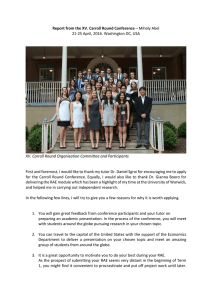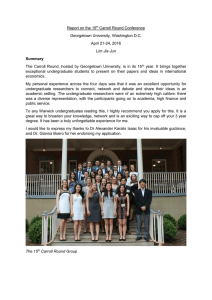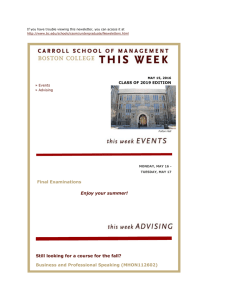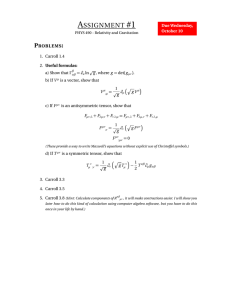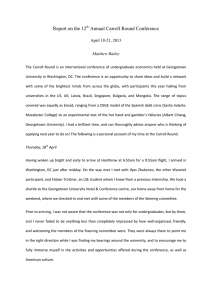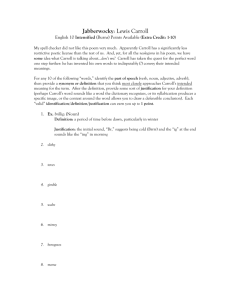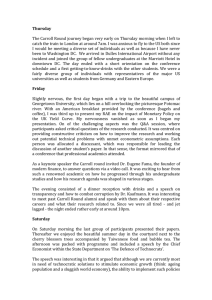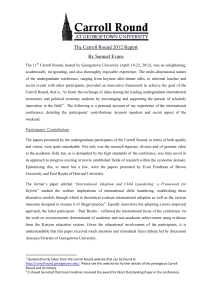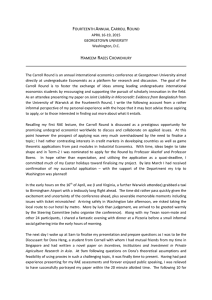9 Carroll Round: Attendance Report Rob Harris June 21, 2010
advertisement
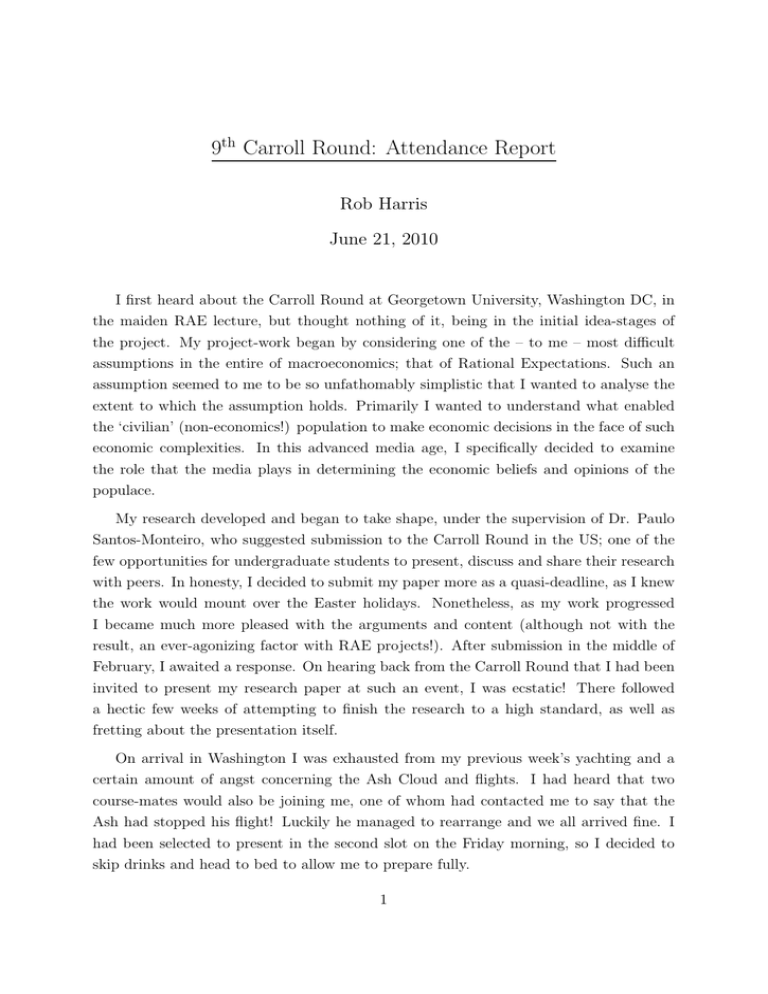
9th Carroll Round: Attendance Report Rob Harris June 21, 2010 I first heard about the Carroll Round at Georgetown University, Washington DC, in the maiden RAE lecture, but thought nothing of it, being in the initial idea-stages of the project. My project-work began by considering one of the – to me – most difficult assumptions in the entire of macroeconomics; that of Rational Expectations. Such an assumption seemed to me to be so unfathomably simplistic that I wanted to analyse the extent to which the assumption holds. Primarily I wanted to understand what enabled the ‘civilian’ (non-economics!) population to make economic decisions in the face of such economic complexities. In this advanced media age, I specifically decided to examine the role that the media plays in determining the economic beliefs and opinions of the populace. My research developed and began to take shape, under the supervision of Dr. Paulo Santos-Monteiro, who suggested submission to the Carroll Round in the US; one of the few opportunities for undergraduate students to present, discuss and share their research with peers. In honesty, I decided to submit my paper more as a quasi-deadline, as I knew the work would mount over the Easter holidays. Nonetheless, as my work progressed I became much more pleased with the arguments and content (although not with the result, an ever-agonizing factor with RAE projects!). After submission in the middle of February, I awaited a response. On hearing back from the Carroll Round that I had been invited to present my research paper at such an event, I was ecstatic! There followed a hectic few weeks of attempting to finish the research to a high standard, as well as fretting about the presentation itself. On arrival in Washington I was exhausted from my previous week’s yachting and a certain amount of angst concerning the Ash Cloud and flights. I had heard that two course-mates would also be joining me, one of whom had contacted me to say that the Ash had stopped his flight! Luckily he managed to rearrange and we all arrived fine. I had been selected to present in the second slot on the Friday morning, so I decided to skip drinks and head to bed to allow me to prepare fully. 1 The next morning I was incredibly nervous! What would people think of my research topic? More importantly, would they be convinced by my instrumental variables?! I also had to prepare a discussion on a fellow presenter’s work; on a ‘semi-parametric model to determine TFP’ and most frighteningly a ‘kernel-matching variant of the propensity score-matching model’ to determine causality in the ‘Learning By Exporting Hypothesis.’ What any of that meant, I still had no idea. It made me consider the standard of the conference to be way beyond anything I had imagined. Anyway, I tried my best, asking things like ‘why do you think propensity score matching is the best method?’ It turned out that this presenter, Daniel Lim, was studying for a PhD, Master’s and Bachelor’s all in one! Therefore, understandably it was out of my league. Next up was my turn. The presentation went very well, the initial nerves disappeared, as I was on ground that I had been covering for the last 6 months; if I didn’t know it by then, I never would! The paper was well received and attended by about 20 people. The discussion afterwards, as I had feared, centered around my instrumental variable assumptions, but I think after about 5 minutes I had managed to dispel doubters! I found the discussion very rewarding in terms of feedback and indeed used some suggestions in my final RAE draft. After that, I could just relax and listen to other presentations, ranging from the causes of civil-conflict (Peter Hull) to the effect of aid on long-term growth prospects (Ben Morley). The Carroll Round Steering Committee had also arranged for a three talks by distinguished economists. One, a mediated discussion, by Dr Philip Levy, about the undervaluation of the Chinese Renminbi, I found fascinating. The economics was simple; China were deliberately depressing their exchange rate, but was it adversely affecting America? What struck my most was the feeling that Americans were being cheated somehow and that America must convince China to change its policy. In my view, I believed China was well within its rights to follow a loose monetary policy in the face of the largest global recession since the Great Depression. Nevertheless, the discussion was enlightening. After a brief excursion into downtown Washington to see the Mall and White House etc. (see below), we had fantastic meal at the Four Seasons hotel, and a further presentation by Dr. Lance Pritchett about the effect of aid on growth. He was very critical of more mainstream development economists such as Jeffery Sachs, the details of the presentation may have slipped my mind with the large quantities of delicious wine that was provided. The following day, another round of fascinating presentations commenced, and, relaxed this time, I listened and participated actively. Later, after an exploration of the beautiful Georgetown University, we had a final enlightening speech by Nobel Laureate 2 Dr. Robert Merton, who discussed the financial crisis and the moral hazard of the risks that were being taken. In his view, the crisis was inevitable, given the state of financial markets. The lecture was given in the wonderful Riggs Library at Georgetown University, and was followed by drinks. Later that evening the delegates had a delightful evening, at which discussion of Economics was expressly banned! The following day, a little worse for wear, the few remaining people traveled into central Washington again for a walk about and the experience Earth Day. The weekend was an absolutely incredible experience, not just hearing about the work of peers, but also the opinions of distinguished keynote speakers and mediated discussions permitted an economic self-indulgence. The reception and welcome of the Steering Committee and all at Georgetown University was delightful and a credit to their University. I also want to thank the University of Warwick and Dr. Paulo Santos-Monteiro in particular for their encouragement and the ability to attend such a wonderful experience to a young economist such as myself. 3
